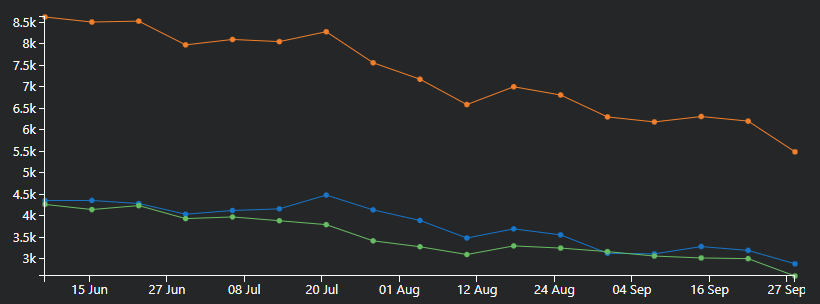I made a conscious decision recently to stop using SO, and when I discussed it with my colleagues and professional friends, I was a little surprised to find out I was the last of my cohort to still use it.
I stumbled over this question as something of a freak chance.
Here's a summary of why some of my colleagues and I stopped:
Extremely Emotionally taxing
The core problem I find it is extraordinarily emotionally taxing to get an answer.
I'm a professional. I have a job. For the most part, I do it quietly and calmly and respectfully to all my colleagues. But when I need to come here, it's a gruelling grind that ultimately becomes an emotional grind. I don't have this same issue anywhere else in my career, and I don't get it from any other forum.
I can spend up to 3 to 4 hours searching for an answer on Google and direct search on SO, drafting a new question with cross references, backstory, everything I've tried, going back and forth trying more things just in case. I can check and triple-check the help to see what's on topic...
... and then I still have to spend the next hour or two arguing just trying to justify that this is indeed a worthy question for the site.
It's too much. I was just looking for an answer to a question.
I can take the exact same problem after the same Google searches yielded no results, draft a question in only 2 minutes and then throw it at any of: GitHub Discussions, Reddit, Library-specific email lists, public Slack channels, and 🎉 helpful answers come back.
By the time I'm done on SO / SE, I'll have burned half a day of Dev time and be completely burned out emotionally.
SO wasn't always this way. Something went wrong.
Slow poisons
Some problems that I've observed for a long time don't cause immediate problems, but I believe they have slowly poisoned the site over the years.
Aging content
Problem: SO's answers are already too old, and it's getting worse.
SO's creators reference this here, start listening from 12:00 to 14:00.
SO has many rules that try to stop questions being asked that simply age out. That's often the justification for "no software suggestions". Other rules are intended to have a similar effect.
But that's a fool's errand that can't work with the pace of change in the software world.
Google hits will often take me to pages over 10 years old nothing pointing me to whether the answer has aged well. I then have to spend at least another half hour on other sites just to be sure I'm not using some archaic deprecated technique.
Poorly applied de-duplication rules have compounded the problem.
SO has no way to automatically age out questions or allow the relevant ones to be earmarked as still relevant a decade later.
Not well aligned with User needs
Problem: The site doesn't allow people to ask the questions they actually need.
As the OP here points out, rules that may have been made in good faith are bit by bit carving out large chunks of questions that people do need to ask. This especially goes for professional questions to the point that it's hard to find something I need in my daily work (senior software dev) that could reasonably fit in SO's rules.
Yes, there are limits to what can be asked here; there MUST be. But the rules we have too often cut across the very needs of professional devs and engineers that might otherwise draw them here.
As an example:
The ban on opinion-based questions was made for worthy reasons. But the extreme application of this rule has also driven out "professional opinion", where professional opinion is much more than just red vs blue, PC vs Apple nonsense.
I know many will want to tell me "we tried that", but what was never assessed was how this rule ultimately drives away users.
Heresy!
Problem: Inability to discuss problems gradually poisons the community.
"Didn't you know? We're building a database ..."
"Are you aware that Stack Overflow has a very different goal than..."
Yes. We know.
These extraordinary responses (and much worse) often follow a pattern I've seen many times in religious circles responding to heresy. I've never seen it anywhere else but meta SO/SE.
The pattern is:
The religious person finds it difficult to comprehend heresy. They might struggle to echo back heretical words even prefixed with "you believe ..."
This behaviour is hard to visualise. This isn't "the elephant in the room"; no, that gets fed and watered daily. Heresy is the hippo in a monastery that the monks simply cannot see. They'll move out of its way when they don't see it coming. They'll press themselves to the wall to get around the thing but claim it was all because god likes walls Psalm 51:18 & Isaiah 26:1. And don't mention the hippo poop, they'll angrily tell you "you put that there!"
When they cannot hear the heresy, in the void left behind, the religious person becomes compelled to explain their religion. They can't discuss the heresy, so they can't argue against it. Instead, they resort to explaining religious fundamentals that aren't even related.
Alternatively, they lie about what the heretic actually said, and argue with the lie.
This is commonly known as a straw man argument. It lets them argue with the heretic, claim that he's wrong, but still not actually comprehend what he was ever saying.
Any single mention of the rules having unintended consequences here is treated as heresy, and what follows is immediate responses of both "Didn't you know? We're building a database ..." and much worse, including straw man arguments that tell likes about an OP's beliefs.
Everyone's a moderator
Problem: Poor low-level moderation is souring the community.
Hopefully ◆Moderators would agree that there is a real skill in their role, and it's not a job for everyone. Good moderation helps a community thrive, bad moderation kills it stone dead.
But the design of SO's moderation approach makes everyone a moderator of a sort, making close votes and negative votes on questions down past 0.
This isn't an approach I've seen replicated anywhere else, and I think that perhaps speaks to a more general opinion of whether this feature is ultimately a good idea.
The most common frustration here is with really weird close votes, often by people with zero domain knowledge of the question.
Anecdotally, across SE, I've seen:
- Theoretical network protocol questions closed because they didn't list their own network CIDR / IPs.
- Questions immediately closed needing details because someone commented "did you mean red or blue acme widgets" The correct answer transpired to apply to both, red and blue, and the detail was irrelevant.
- Questions closed for not showing what was tried, when the question clearly stated their original approach, and that it had stopped working with a version release, and clearly stated they couldn't find any other option.

